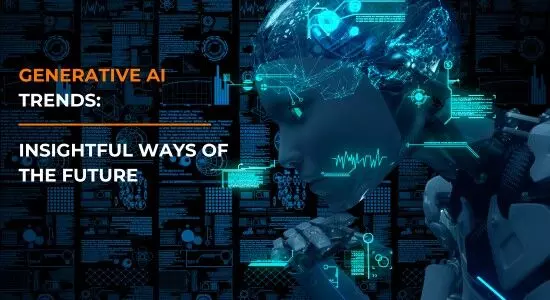Generative AI Trends: Insightful Ways of the Future

Generative AI is a subset of artificial intelligence. Since its inception, it has been revolutionizing industries by enabling machines to create content, art, and solutions autonomously. With models such as OpenAI's ChatGPT and Google's Gemini dominating the competitive landscape with billions of global users, Gen AI has become a popular term.
Today, businesses across various industries are leveraging Gen AI to improve their overall operations and performance. One report estimates that the Generative AI market will experience a substantial CAGR of 37.3%, boosting its value to a staggering $1,811.8 billion. These advancements will transform industries and solidify the importance of Generative AI as a critical technological asset for global businesses.
Defining Generative AI
Generative AI uses artificial intelligence principles to generate new content based on learned patterns and data. It can generate various outputs such as images, text, melodies, or code. Contrary to popular belief, it differs from traditional AI, which relies on predetermined protocols and information. The major differentiation lies in the factor that this technology can create original outcomes without direct human input.
By employing deep learning and neural networks, it can understand complex patterns and mimic them effectively, resulting in human-like and innovative outputs. Generative AI is widely used in business functions for research, content creation, creative design, and data analysis. Its vast potential can transform our interaction with technology and create new experiences in the digital realm.
Importance of Generative AI in Various Industries
Generative AI has an immense impact on various industries by fostering innovation, improving efficiency, and enabling capabilities that were once thought to be impossible.
For healthcare, it assists in medical image analysis, hastens drug discovery, facilitates definitive patient diagnoses, and personalizes treatment regimens. Moreover, healthcare professionals can now make precise evaluations using this advanced technology, leading to improved patient outcomes.
In manufacturing, it helps with product design, process optimization, predictive maintenance, and quality control. It also aids companies in increasing operational efficiency, reducing expenditures, and speeding up product development.
For financial institutions, Generative AI is used for fraud detection, risk assessment, algorithmic trading, and automated customer services. At the same time, this technology makes decisions based on data, improving security and can give personalized financial advice to customers.
Furthermore, in retailing, it powers recommendation systems, visual search tools, inventory management, and customer engagement platforms. Moreover, it enhances the shopping experience, increases sales, and enables retailers to understand consumer preferences better
Besides the entertainment sector applies Generative AI for content production, virtual reality experiences, video game development, and music composition, or even more importantly creators might use it to create interesting content that stretches cultural boundaries.
Use Cases of Generative AI
Art and Creativity
Artists have revolutionized art and music using Generative AI, creating unique masterpieces that defy conventional concepts of ingenuity.
Content Creation
Generative AI is also transforming marketing by generating personalized and captivating content on a large scale, amplifying customer engagement and brand recognition.
Healthcare and Medicine
In the healthcare industry, Generative AI is propelling progress in drug development, medical image interpretation, and tailored treatment strategies by analyzing extensive data to identify patterns and improve patient outcomes.
Gaming and Simulation
The gaming industry is also experiencing a transformative shift with Generative AI, creating immersive experiences through simulations and dynamic content generation, revolutionizing gameplay, graphics, and storytelling.
Ethical and Social Implications
The implementation of Generative AI presents immense advantages and potential yet simultaneously raises significant moral and societal concerns. A primary ethical predicament revolves around the possibility of exploitation of this technology, resulting in the creation of falsified material such as deepfakes, disinformation, and propaganda.
Additionally, the consequences can be dire for public confidence, individual privacy, and the balance of society. Furthermore, Generative AI models trained on biased data can carry their biases forward. When these biased systems are used, there is a chance of discrimination in areas like hiring, lending, and law enforcement.
As Generative AI is adopted through various aspects of our society, it is crucial to address these ethical implications proactively. That means robust governance frameworks, fair practice policies, and, above all, human judgment.
Challenges and Limitations of Gen AI
Generative AI faces several challenges and limitations that impact its effectiveness and application across various industries. Some of these challenges are:
- Dependency on high-quality and diverse training data, as the accuracy and diversity of the data directly influences the quality of the generated output
- Computational requirements to run the models, posing a barrier to mass adoption
- Ethical and societal implications-such as the potential misuse of Generative AI for creating deepfakes or spreading misinformation
- Ongoing debates about the originality and creativity of AI-generated works, particularly in artistic fields
- Understanding how Generative AI models make decisions can be complex due to their "black box" nature-raising issues around transparency and trust
Real-world Implementation of Gen AI
Various companies across different industries actively utilize Generative AI to drive innovation and efficiency in their operations.
- The British Broadcasting Corporation (BBC) has integrated advanced Natural Language Processing (NLP) models to automate content generation processes, enhancing production speed and efficiency while expanding its digital footprint and increasing user engagement
- International bank HSBC has leveraged Generative AI in virtual assistants and customer support systems, streamlining operations and significantly reducing response times to enhance customer satisfaction
- ASOS, an online fashion retailer, has incorporated Generative AI into its creative design process. This innovative approach accelerates product development cycles by testing market demand for new designs before physical production. It leads to improved quality and reduced time and cost involved in product development
Summing it up – The Good, The Bad and The Ugly
Generative AI encompasses a spectrum of outcomes: it unlocks unprecedented creativity, automates complex tasks, and revolutionizes industries with innovative solutions. However, there is also potential for misuse - creating deepfakes, spreading misinformation, and amplifying biases. The good side showcases its ability to unleash creativity and transform industries effortlessly. Yet, the flip side reveals the dangers of deepfakes and rampant misinformation fueled by biases.
Generative AI can have negative consequences when exploited for malicious purposes, eroding trust, privacy, and societal norms. But, these challenges are not invincible.
By following ethics and best practices during the model development, we can harness Gen AI's true power for the greater good while mitigating adverse impacts. This will ensure a future where innovation and ethics coexist.








